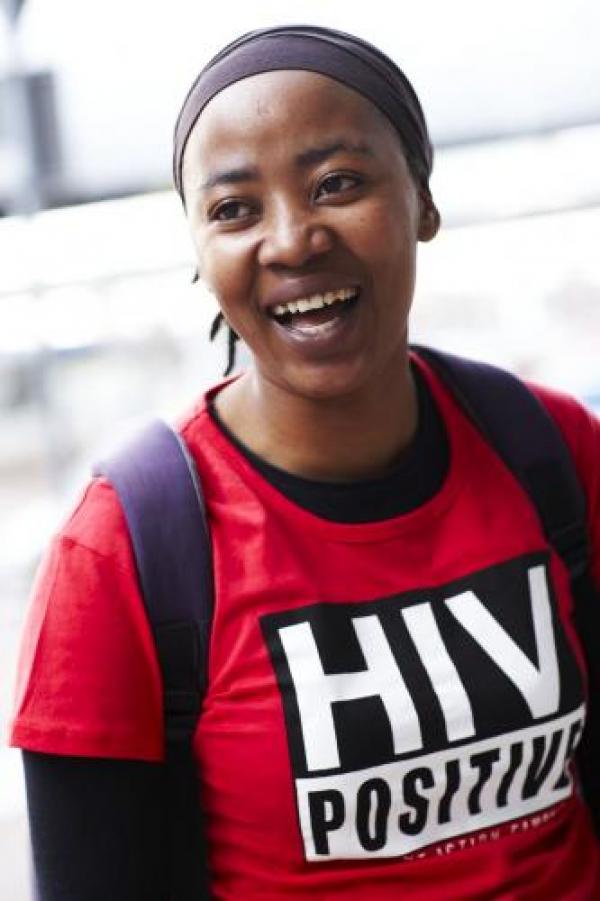

Vuyiseka Dubula. Photo from TAC website.
30 July 2013
The government is discontinuing the provision of free formula milk at public health facilities. This policy is intended to promote exclusive breastfeeding for all mothers, including those living with HIV.
Children who are not breastfed are six times more likely to die from diarrhoea and have a higher chance of respiratory illnesses. Breastfeeding is one of the most important interventions for preventing child deaths.
I am 35 years old, HIV-positive and a mother of two. I began my antiretroviral treatment two years before my first daughter was conceived. I was initiated on antiretroviral treatment in June 2004 and my CD4 count (a measure of how strong my immune system was) was 352 at the time. In healthy people, CD4 counts are usually well above 500. I did not qualify to be on treatment then because at the time the South African treatment guidelines said that patients should only be initiated when their CD4 count was 200 or below. I convinced my doctor and he put me on treatment. By the end of three months on treatment my viral load (the amount of HIV in my body) was undetectable and has stayed undetectable since then.
I had my first child, a girl in December 2006 and I was still undetectable. I chose caesarean section and I did not want to breastfeed. My child was negative at six weeks and my husband remains negative. I just had my second child, a boy, after nine years on antiretroviral treatment. I am still on the same regimen that I started in 2004. Again, I chose to have a caesarean section and to formula feed my baby.
Many women because of the fact that they come to know about their HIV status during pregnancy might struggle to make the decision to start treatment. Even when they do start during pregnancy, they might struggle to remain in care after delivery. Our health system must therefore aim to identify women living with HIV with CD4 counts below 500 and offer them treatment, as per the new World Health Organisation guidelines, even before pregnancy comes into the picture. This will free many HIV-positive women to deal with their own internal challenges of taking treatment for themselves so that if they decide to become pregnant they do not have the added burden of starting treatment during a challenging time.
I understand the overwhelming evidence that supports breast feeding. I support this for those mothers who can do it, even under current challenging conditions, like during work. I salute them. But most work environments made it difficult to breastfeed. I am a full-time working mother whose job requires travelling outside the province where I reside. Sometimes I work overtime. I have to be up at 5am to prepare my grade one daughter for school. Soon after than I run to the gym at least for an hour and a half everyday. This is very important for my mental and physical health. My days are busy. If I was unemployed and had a husband that earned enough for both of us then maybe I would consider breastfeeding. I do not know how women who are actively seeking a job or full-time employed manage to breastfeed. I know for sure it would not work for me even though I have access to clean water and heating options for water because I stay in an urban area.
Balancing the risk of my child from getting HIV through breastfeeding against the risk of death from causes other than HIV, in particular diarrhoea, is not an easy task. Recent studies have shown that giving antiretrovirals to either the HIV-positive mother or HIV-exposed infant can significantly reduce the risk of transmitting HIV. Hence women living with HIV who choose to breastfeed must make sure that that their viral loads are undetectable for the duration of breastfeeding. Early antiretroviral initiation for women is key to making the new breastfeeding policy successful. We also need a radical change in how workplaces support breastfeeding women. Women need to be counselled about the importance of adherence to their antiretroviral treatment while breastfeeding, so that their viral load does not become detectable, increasing the risk of transmission.
The most important thing is that I have done all that I can to reduce the risk of transmission for both my kids. I do not feel I am under pressure to breastfeed because of my culture.
We need to educate communities about the benefits and risks of both feeding options without forcing a decision upon women. Conditions for women vary and we need to take this into account. Formula milk must not be taken off shelves and it must be made available in public health facilities for mothers who choose to use it. We must keep options open for women who choose not to breastfeed.
Dubula is the General Secretary of the Treatment Action Campaign. You can follow her on Twitter @VuyisekaDubula.